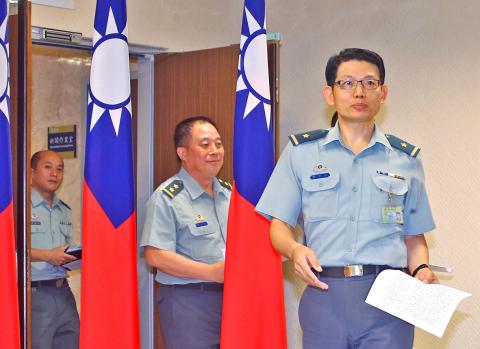The Ministry of National Defense late on Tuesday said its policy to phase out conscription and implement an all-volunteer military would be postponed again, as recruitment targets could not be met.
The plan to abolish the conscription system is to be pushed back at least to the end of next year, though it would still depend on the number of voluntary enlistments and other conditions at that time.
Critics and media called the postponement an embarrassing setback for President Ma Ying-jeou (馬英九); another “bounced check” among many promises Ma has made.

Photo: CNA
Establishing an all-volunteer military, consisting entirely of career soldiers, is considered one of Ma’s most important pledges and seen as an important test of fulfilling major government policies in his second term.
A total of 23,100 people, males aged 18 or over, would be affected by the postponement, according to the ministry’s announcement.
“Conscription is needed to cope with hostile threats from the enemy, escalating tensions in the region, the need for high combat readiness among the armed forces, and to effectively respond to disaster rescue and relief, and other emergencies,” the statement said.
According to officials, the ministry said Ma was informed of situation at a recent top-level military meeting, and the Cabinet approved the decision.
Ministry officials said compulsory military training is still in effect for males born after Jan. 1, 1994, who are still required to undergo four months of basic military training.
This is the second time that the ministry has pushed back its implementation of an all-volunteer military after not being able to meet its targets.
In September 2013, the ministry said the date would be pushed back two years because of recruitment difficulties and other situations among the branches of the armed forces.
In the original plan, the armed forces were scheduled to end compulsory military service for males born before Jan. 1, 1994, starting from Jan. 1 next year.
Tuesday’s statement marked an abrupt reversal, as the ministry announced just last month that shifting from conscription to an all-volunteer force was on track and it had reached 71 percent of its recruitment goal for the year, due to improved stipends and other incentives.
According to a high-ranking ministry official, as Taiwan is facing many “complicated circumstances and new challenges both internally and externally,” and as the situation is constantly changing, next year’s date could be pushed back again.
National conscription might even be kept, the official said.
“It will depend on adjusting to contingencies and new situations next year,” he added.
Presidential Office spokesperson Charles Chen (陳以信) said the military is on a “combined conscription and volunteer force,” and as such is not implementing an “all-volunteer force.”
“Due to false expectations, created when the term ‘all-volunteer force’ began to be used, it is not the case — as media reports have said — that this is a ‘bounced check on the all-volunteer force promise,’” Chen said.
“It was never the case,” he said.
Additional reporting by Wang Yu-chung

Conflict with Taiwan could leave China with “massive economic disruption, catastrophic military losses, significant social unrest, and devastating sanctions,” a US think tank said in a report released on Monday. The German Marshall Fund released a report titled If China Attacks Taiwan: The Consequences for China of “Minor Conflict” and “Major War” Scenarios. The report details the “massive” economic, military, social and international costs to China in the event of a minor conflict or major war with Taiwan, estimating that the Chinese People’s Liberation Army (PLA) could sustain losses of more than half of its active-duty ground forces, including 100,000 troops. Understanding Chinese

The Ministry of Foreign Affairs (MOFA) yesterday said it is closely monitoring developments in Venezuela, and would continue to cooperate with democratic allies and work together for regional and global security, stability, and prosperity. The remarks came after the US on Saturday launched a series of airstrikes in Venezuela and kidnapped Venezuelan President Nicolas Maduro, who was later flown to New York along with his wife. The pair face US charges related to drug trafficking and alleged cooperation with gangs designated as terrorist organizations. Maduro has denied the allegations. The ministry said that it is closely monitoring the political and economic situation

‘SLICING METHOD’: In the event of a blockade, the China Coast Guard would intercept Taiwanese ships while its navy would seek to deter foreign intervention China’s military drills around Taiwan this week signaled potential strategies to cut the nation off from energy supplies and foreign military assistance, a US think tank report said. The Chinese People’s Liberation Army (PLA) conducted what it called “Justice Mission 2025” exercises from Monday to Tuesday in five maritime zones and airspace around Taiwan, calling them a warning to “Taiwanese independence” forces. In a report released on Wednesday, the Institute for the Study of War said the exercises effectively simulated blocking shipping routes to major port cities, including Kaohsiung, Keelung and Hualien. Taiwan would be highly vulnerable under such a blockade, because it

UNRELENTING: China attempted cyberattacks on Taiwan’s critical infrastructure 2.63 million times per day last year, up from 1.23 million in 2023, the NSB said China’s cyberarmy has long engaged in cyberattacks against Taiwan’s critical infrastructure, employing diverse and evolving tactics, the National Security Bureau (NSB) said yesterday, adding that cyberattacks on critical energy infrastructure last year increased 10-fold compared with the previous year. The NSB yesterday released a report titled Analysis on China’s Cyber Threats to Taiwan’s Critical Infrastructure in 2025, outlining the number of cyberattacks, major tactics and hacker groups. Taiwan’s national intelligence community identified a large number of cybersecurity incidents last year, the bureau said in a statement. China’s cyberarmy last year launched an average of 2.63 million intrusion attempts per day targeting Taiwan’s critical